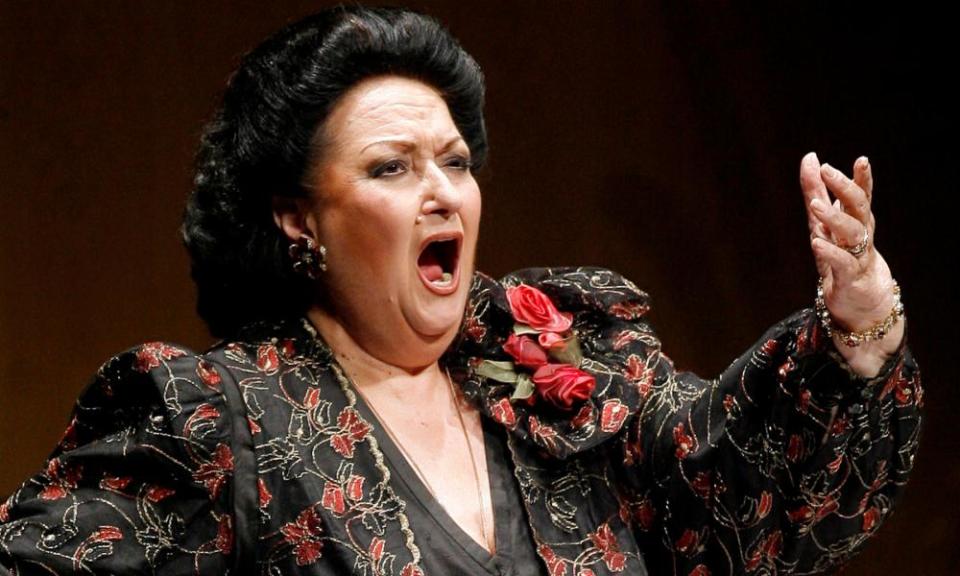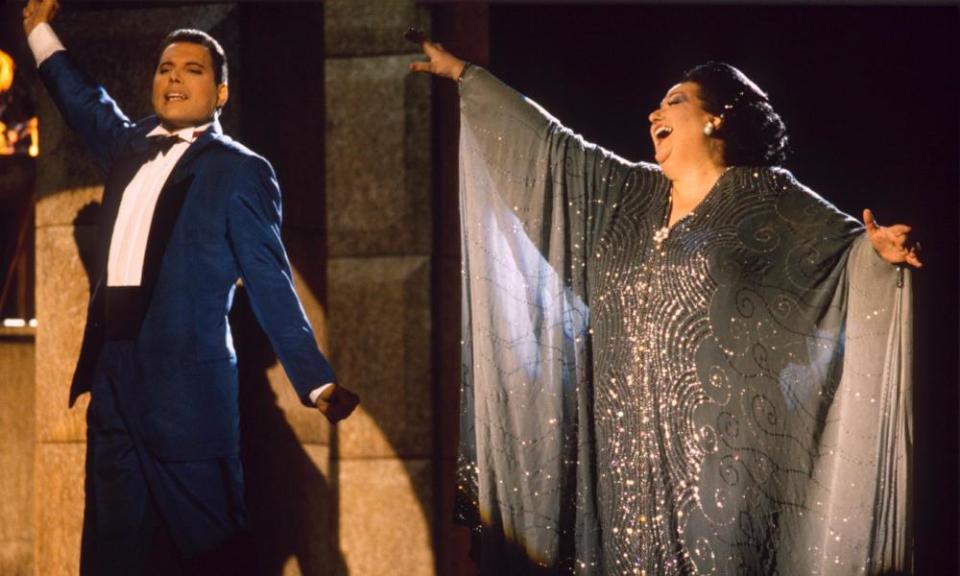Montserrat Caballé obituary

One of the most exciting singers on the opera stage in the final four decades of the 20th century, Montserrat Caballé, who has died aged 85, was a throwback to an earlier generation of divas. She blithely ignored the new hegemony that made conductors and directors, rather than singers, the dominant figures in opera, confident that she was unsurpassed in vocal refulgence and bel canto technique – qualities she was delighted to deploy in an Olympic anthem for her native Barcelona with Freddie Mercury.
A substantial presence who paid scant regard to the nuances of the production in hand, she suggested motion through her soft-grained, lyrical singing and her expressive face. Offstage, always charming and self-deprecatory, she displayed an ingrained ability to enjoy life to the full, in spite of the many vicissitudes that affected her in the form of accidents and illnesses, and, along the way, to give enormous pleasure to others.
Behind that demeanour, she had reserves of strength and determination that came out of adversity in the Spanish civil war. She was the daughter of Carlos Caballé i Borrás, an industrial chemist, and his wife, Anna Folch: when she was four the family were bombed out of their home. Her fortunes changed when a wealthy family paid for her to have seven years of training at the Liceo, the conservatoire that had given its name to the city’s opera house. There she won the gold medal in 1954, although a fainting fit and consequent dispute among the judges prevented the award being presented until some years later.
She averred that she owed practically everything she achieved to two devoted teachers, Eugenia Kemeny and Conchita Badia, the latter herself a noted Spanish soprano. Kemeny, who was at once an athlete and a singer, taught the young Montserrat the stringent breathing exercises that she practised throughout her career. To these teachers, to the unflagging support of her brother Carlos, and to her indomitable will she owed the longevity of her career.
After she went to the Basel opera in 1956, she started in small roles such as the First Lady (The Magic Flute) and worked as a waitress. She soon graduated to Donna Elvira (Don Giovanni), Fiordiligi (Così Fan Tutte), Pamina (The Magic Flute), the title roles of Aïda, Tosca, and Strauss’s Salome, Ariadne, Arabella and Chrysothemis (Elektra).

When she moved to Bremen in 1959 she added Violetta (La Traviata), Tatyana (Yevgeny Onegin) and the title roles of Madama Butterfly and Rusalka, while taking smaller roles in larger houses, including La Scala, Milan, without making a particular mark.
Her breakthrough Donna Elvira at the Vienna State Opera in 1960 was followed by Arabella back in Barcelona at the Liceo, where she was to appear for the following three decades in a wide variety of roles. But it was in 1965, when she replaced an ailing Marilyn Horne in the title role of Donizetti’s Lucrezia Borgia, in a concert performance for the American Opera Society in New York, that her career really took wing.
She became an international star overnight. The limpid beauty and innate style of her singing as the Donizettian heroine won all hearts. Here, as in all her future successes, her interpretation always expressed character, not merely bravura display. She had already been engaged for the 1965 season at Glyndebourne as both Countess Almaviva in Le Nozze di Figaro and the Marschallin in Der Rosenkavalier, and then made her debut at the Metropolitan in New York, as Marguerite in Faust, another triumph. The year before she had married the Spanish tenor Bernabé Martí, whom she had met in a production of Madama Butterfly, when he stood in at late notice for a singer who was indisposed.
Covent Garden eventually engaged her in 1972 – as Violetta, a memorable occasion both for Caballé’s vocal virtuosity and for her appealingly sincere portrayal. She had already endeared herself to London audiences in concert performances of Bellini and Donizetti under the aegis of the London Opera Society. These had established her as a serious rival to Joan Sutherland in that field, as she was to become in Rossini and early Verdi. At the same time she was committing to disc many of her best roles, among them Bellini’s Elvira (I Puritani) and Imogene (Il Pirata), and Violetta in a complete account of La Traviata.
Her recital recordings of rare Bellini, Donizetti and Verdi were much admired: they display to perfection her gifts for a long, seamless line, refined phrasing, and floated pianissimi on high notes, not to forget the sheer ethereal beauty of her voice itself. Often compared with Maria Callas, she lacked her predecessor’s explosive intensity of utterance and powerful acting, but offered instead sublime tone and effortless technique.
She did not neglect heavier roles, although these sometimes taxed her resources. Strauss’s Salome, which she also recorded, was a particular favourite; so were the Verdi roles of Amelia (Un Ballo in Maschera) and Elisabetta (Don Carlos), with which she conquered the Met anew in 1984. Tosca was another speciality, and she recorded it with Colin Davis conducting (1976).
Towards the end of her career, ever searching for pastures new, she undertook the title roles in Cherubini’s Medea, Spontini’s Agnes von Hohenstaufen, Pacini’s Saffo and Rossini’s Ermione, as well as Madama Cortese in Rossini’s recently unearthed Il Viaggio a Reims, which she sang memorably at the Vienna State Opera and in her final appearances at Covent Garden, in 1988.
At the Liceo she added – perhaps unwisely – Wagner’s Sieglinde (Die Walküre) and Isolde to the more suitable Elsa (Lohengrin) that she had sung early in her career. Her farewell appearance in that house came as Catherine d’Aragon in Saint-Saëns’ Henry VIII in 2002.
Her repertory of song stretched from classical examples to modern Spanish music. She was an accomplished and charming recitalist, not above – at the close of a programme – guying near-contemporaries such as Elisabeth Schwarzkopf and Luciano Pavarotti, disclosing her innate sense of humour.
In 1987, the mayor of Barcelona invited her to provide a theme song for the Olympic Games to be held in the city in 1992, giving the BBC the music for its television coverage. For this, she collaborated on the album Barcelona (1988) with the lead singer of Queen, Freddie Mercury, whom she knew to be a keen opera lover and who called her voice “the best in the world”.
The title track took Caballé and Mercury to No 8 in the charts in November 1987. Neither made any concession to the singing style of the other in attempting to widen their respective audiences, and the single’s exuberant classical gestures made it a far more effective exercise in crossover than most. Mercury’s death in 1991 brought the unlikely partnership to an end, but in 1998 Caballé made a guest appearance for Vangelis on his album El Greco, inspired by the painter.
Caballé found it difficult to leave her public, and continued to present new concert material, with varying degrees of success, into the new century. In 2015 she was given a suspended prison sentence of six months for tax evasion.
On her husband’s farm she could be found in jeans and cowboy hat, happily driving an off-road vehicle. However heavenly her singing, she was always down to earth at heart.
She is survived by Bernabé and their son and daughter.
• Montserrat Caballé (María de Montserrat Bibiana Concepción Caballé i Folch) soprano, born 12 April 1933; died 6 October 2018
• Alan Blyth died in 2007

 Yahoo News
Yahoo News 